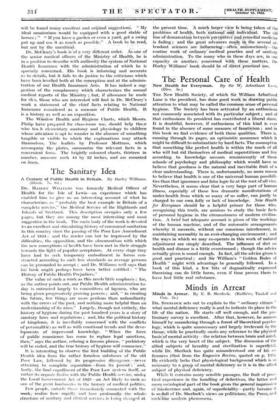Minds in Arrear
DR. SHERLOCK sets out to explain to the " ordinary citizen " what mental deficiency really is and to indicate its place in the life of the nation. He starts off well enough, and the pre- liminary survey is excellent. After that, however, he anuses himself by meandering through a forest of theoretical psycho- logy,-which is quite unnecessary and largely irrelevant to the theme, while he practically omits anyreference to the physical basis of mental activity--the relation between brain and mind, which is the very heart of the subject. The discussion of the allied subjects of heredity and sterilization is superficial, while: Dr. Sherlock has quite misunderstood one of his re- ferences (that from the Eugenics Review, quoted on p. 139). He evidently lacks that physiological background which is as necessary to a grits, of „mental:deficiency as` it is itithe allied subject of phyileal deficiency. - While it contains many sensible passages, the fruit of prac- tical experience in the handling of defectives, the latter and snor5 sociological part of the book gives the general impression of incoherence and, again, of superficiality—partly becatise it is so all of Dr. Sherlock's adews on politicians; the Pres4;. and -sucht-Iikc modern phenomena.


























































 Previous page
Previous page